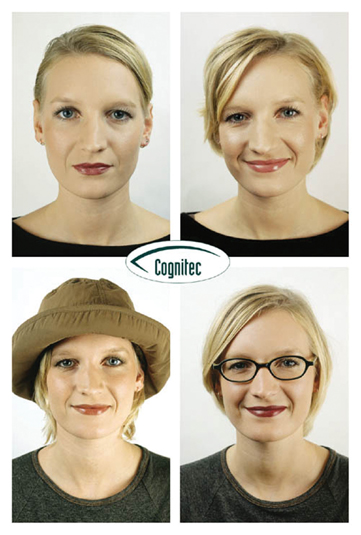By Sabine Zeissig
|

|
|
Photo by Cognitec Systems |
SURVEILLANCE APPLICATIONS
What sets apart facial recognition from other biometric applications? One major point would be that it can be used for surveillance purposes. For example, public safety authorities want to locate certain individuals such as wanted criminals, suspected terrorists, and missing children. Facial recognition may have the potential to help the authorities with this mission.
People are generally very good at recognizing faces they know. However, when they are confronted with an unfamiliar person they start to experience difficulties. Combined with relatively short attention spans or reaction times, it is difficult for humans to pick out strange faces.
FaceVACS face recognition software developed by Cognitec Systems, based in Germany, has grown into a well-established name on the market.
It all began in 1995 when the first algorithm which was later to be incorporated into all FaceVACS products was developed by a small group of software engineers and algorithm specialists. Since then the company as well as its reputation has grown steadily. The first major breakthrough came as Cognitec Systems took part in the renowned Face Recognition Vendor Test 2002 and proved to be the leading technology available on the market. These evaluations are designed to provide U.S. Government and law enforcement agencies with information to assist them in determining the performance of face recognition technologies in various use cases, as well as the comparison of vendors and technology developed by research institutes.
Industry and government customers use FaceVACS for physical access control since 1996. The installation of the SmartGate system at Sydney International Airport in 2002 was a first major step towards a solution for automated border control using Cognitec’s software. SmartGate was one of the first installations of its kind to take a live image of a traveler’s face, and, using facial recognition technology, match this image with the digitized image stored in their E-Passport. If there is a successful match, the traveller will be cleared through the immigration control point. If there is no successful match, they will be referred to an immigration officer.
TECH IN ACTION
Since 2001, the market has been growing constantly. This has also increased the demand for security solutions. All this offers an ever-evolving challenge for this steadily growing company. New analysis from the International Biometrics Group (IBG) shows the annual revenues of the Biometrics market to be US$3 billion in 2005, with a growth rate of 30 percent to reach US$7.4 billion in 2012.
FaceVACS technology has been designed to safely recognize persons independently of variances that appear to human faces. FaceVACS technology handles pose, mimic, ageing variance as well as variances coming from new hair styles, glasses or temporary lighting changes. Algorithmic leadership, optimizing fine tuning over the last years resulted in the best-of-class variance independency, showing excellent verification and identification results.
Cognitec’s product line includes software packages for:
-
Photo capture for biometric enrollment of facial images conforming to ISO 19794-5, e.g., for personalization of electronic passports and other ID documents;
-
Database search for duplicate checks in very large photo databases to prevent fraud during ID document issuance;
-
Verification of the passport holder at border control by automatic comparison of the facial image;
-
Watch list check against photo databases at border control;
-
Computer-assisted video surveillance to identify persons in video images;
-
Facial verification for physical access control and time & attendance.
Offices in the U.S.A., Hong Kong, Brazil as well as representatives in the U.K. are now working together to rise up to the challenges provided by large projects such as the contract that was won after a pan-European tender to provide software and services to the German Federal Criminal Police Office (Bundeskriminalamt - BKA). On the basis of photographs and video material, Cognitec’s face recognition software supports the research and identification of unknown suspects. This kind of procedure is mainly used when identification attempts using fingerprint or DNA have failed or are unsuitable. Research in a central, digital photo archive to identify a criminal helps in cases where only a photograph of an unknown suspected person exists. The Federal Criminal Police Office is using Cognitec’s software and respectively such type of research in a number of occasions, such as the tracing down of persons who, in the cause of the investigation, appear suspicious by using fake personal documents or payment cards or, for instance being involved in bank robberies. It will also be used for the identification of missing and helpless persons.
With the introduction of the biometric passports in 2005, another interesting use case opened up, as a capture and verification solution for biometric passports, as deployed in cooperation with Siemens in Switzerland. This type of passport not only involves “engraving” personal data into the document, but also storing it on microchip. “Pass 06” the passport which, from 4 September 2006, bears the international symbol for machine-readable data on the front cover. The cover itself includes a thin RFID chip with an antenna. The chip electronically stores personal data, such as last name, first name, etc., of the kind that is also visible in the passport, as well as a digital photo of the holder. This data can be read at short distance by special document readers, e.g., in border control scenarios, provided the passport is first opened to expose the machine-readable zone. Then, it is possible to capture a live facial image of the passport holder and compare it with the one stored on the chip., making traveling with a fake passport more or less impossible.
Sabine Zeissig is Assistant of Sales & Marketing for Cognitec Systems (www.cognitec.com).
For more information, please send your e-mails to swm@infothe.com.
ⓒ2007 www.SecurityWorldMag.com. All rights reserved.
|



